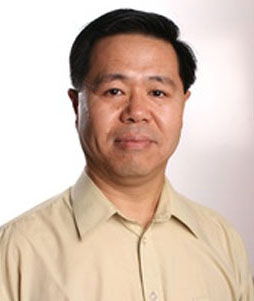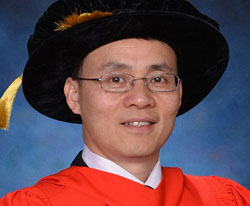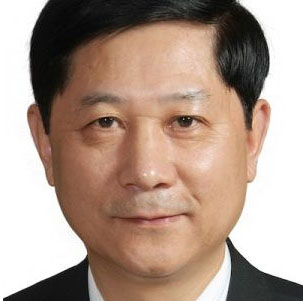
Professor Zhang (above) is a mathematics and statistics academic specialising in quantum field theory. In 2018, while working at USYD, Zhang took up a Thousand Talents scholarship with Shandong Normal University. He is also listed as an academic at the University of Science and Technology of China, where he is available as a supervisor for doctoral students. He has received 12 grants from the ARC totalling more than $3m. USD said it was “unable to comment on Mr Zhang’s situation.” Zhang says he has never conducted research connected to military applications.
The US has launched more than 1000 investigations into China’s actual and attempted theft of American technology, swooping on scores of academics in high-profile cases that have shaken the world of academia.
Many of the 1000 FBI probes into actual theft or attempted theft of US technology involve the Thousand Talents program.
There has also been a US Senate inquiry into China’s talent recruitment plans, the most prominent of which is Thousand Talents, with its report finding plan members had downloaded sensitive electronic research files before returning to China, submitted false information when applying for grant funds and “wilfully failed to disclose receiving money from the Chinese government on US grant applications”.
The US National Science Foundation’s Rebecca Keiser said the NSF had issued a policy making it clear its personnel “cannot participate in foreign government talent recruitment programs”.
The “Thousand Talents Plan” is a Chinese Government program to recruit top scientists from around the world.
It was originally designed to reverse China’s brain drain.
Under Xi Jinping’s civil-military fusion, the Thousand Talents Plan helps China achieve technological and innovation advances.
Western academics have been recruited through their colleagues, superiors or even via LinkedIn.
They are offered a lucrative second-salary, upwards of $150,000 a year, with generous research funding.
Some academics are given an entire new laboratory in a Chinese university and team of research staff.
Many are proud of their Thousand Talents link and participate with consent of their universities. Others have not disclosed the link to their universities and do not publicly admit to being part of the program.
Some Thousand Talents contracts stipulate they cannot disclose their participation in the Chinese Government program without permission.
They continue to work full-time for their Australian university while making frequent trips to China to visit the affiliated Thousand Talents Plan university.
They continue to apply for Australian Research Council grants, with no checks about where the research will end up.
Their new inventions are patented in China, often secretly.
The inventions may be commercialised, with China reaping the economic benefits.
Thousand Talents academics may be required to recruit more academics.
“Such participation poses significant risks of inappropriate foreign influence on NSF policies, programs and priorities, including the integrity of NSF’s merit review process — risks we simply do not accept,” she said.
“The Department of Energy considers such programs to include any foreign state-sponsored attempt to acquire US scientific-funded research or technology through foreign government-run or funded recruitment programs that target scientists, engineers, academics, researchers and entrepreneurs.”
FBI director Christopher Wray said the Thousand Talents Program was a way for China to steal intellectual property that was then used to compete against the very companies it “victimised — in effect, cheating twice over”.
“Through its talent recruitment programs, like the so-called Thousand Talents Program, the Chinese government tries to entice scientists to secretly bring our knowledge and innovation back to China — even if that means stealing proprietary information or violating our export controls and conflict-of-interest rules,” he said in a speech to the Hudson Institute on July 7.
“They’re targeting research on everything from military equipment to wind turbines to rice and corn seeds. The stakes could not be higher, and the potential economic harm to American businesses and the economy as a whole almost defies calculation.”
The “Thousand Talents Plan” has been described by FBI director Christopher Wray as “economic espionage”.
Some Thousand Talents academics keep their links to China secret even from their Australian universities, while others are open about their involvement.
Under “Thousand Talents Plan” contracts, scientists legally sign away the rights to their intellectual property to China.
A standard clause in the contracts states China: “owns the copyrights of the works, inventions, patents and other intellectual properties produced by Party B (the academic) during the Contract period.”
Many contracts order the scientist to observe Chinese legal system, stating the academic: “shall observe relevant laws and regulations of the People’s Republic of China and shall not interfere in China’s internal affairs.”
Australian academics are also warned about religious practices, with contracts often stating: “Party B shall respect China’s religious policies, and shall not conduct any religious activities incompatible with his/her status as a foreign expert.”
They are offered a lucrative second salary, upwards of $150,000 a year, with generous research funding.
Other perks include travel, tuition for their children and housing subsidies.
Some academics are given an entire new laboratory in a Chinese university and team of research staff to work for them.
They then have a “clone” team in China – often unbeknownst to their Australian employer.
The academic often makes numerous trips to China to conduct research.
The aim of the program is to ‘own’ the research conducted and paid for by western universities.
Another Thousand Talents contract states: “We anticipate that you will make several trips to China each year during the term of your engagement, but will perform much of your work remotely.”
China will benefit from the commercialisation: “Should Chinese scientists contribute to your discoveries in China, as we anticipate.. and our institutions will jointly own, protect and manage the commercialisation of these jointly-made discoveries.”
In one instance uncovered by federal authorities in the US, a postdoctoral researcher who was a Thousand Talents scholar working for the Energy Department’s National Laboratory, removed 30,000 electronic files before leaving for China. The researcher had claimed their work would play a “critical role in advanced defence applications”.
They “planned to leverage the Chinese university’s strength in national defence and military research to support the modernisation of the People’s Republic of China’s national defence”.
Mr Wray said in the field of academia, “through talent recruitment programs like the Thousand Talents Program … China pays scientists at American universities to secretly bring our knowledge and innovation back to China — including valuable, federally funded research”.
“To put it bluntly, this means American taxpayers are effectively footing the bill for China’s own technological development.
“China then leverages its ill-gotten gains to undercut US research institutions and companies, blunting our nation’s advancement and costing American jobs. And we are seeing more and more of these cases.”
The FBI arrested Qing Wang, a former researcher with the Cleveland Clinic who worked on molecular medicine and the genetics of cardiovascular disease, in May, and Simon Saw-Teong Ang, a University of Arkansas scientist doing research for NASA
“Both of these guys were allegedly committing fraud by concealing their participation in Chinese talent recruitment programs while accepting millions of dollars in American federal grant funding,” he said.
US prosecutions have reached the highest levels of reputable universities. The chair of Harvard’s Department of Chemistry and Chemical Biology, Charles Lieber, was indicted in June for “making false statements to federal authorities about his Thousand Talents participation”.
“The US has alleged that Lieber concealed from both Harvard and the NIH his position as a strategic scientist at a Chinese university, and the fact that the Chinese government was paying him, through the Wuhan Institute of Technology, a $50,000 monthly stipend, more than $150,000 in living expenses and more than $1.5m to establish a laboratory back in China,” Mr Wray said.
In one instI’ll sort drop ance, US scientist Hongjin Tan, who was part of the Thousand Talents program, was sent to prison after stealing more than $1bn worth of trade secrets from his US employer, a petroleum company. In another example, Texas scientist Shan Shi, also part of the Thousand Talents plan, was sentenced to prison after stealing “trade secrets” related to naval technology used in submarines.
“In one of the more galling … aspects of the scheme, the conspirators actually patented in China the very manufacturing process they’d stolen, and then offered their victim American company a joint venture using its own stolen technology,” he said.
Sharri Markson
The Australian August 24, 2020
Thousand Talents scholars and academics in similar recruitment programs

Xiao-lin (Joshua) Zhao 赵晓林, University of NSW
Professor Zhao was a lecturer at Monash University until April last year, when he was appointed the associate dean of UNSW Engineering. He specialises in hybrid construction and advanced materials. Reports from a gathering at the Melbourne Chinese Consulate in 2011 note Zhao was part of the Thousand Talents plan, through Tsinghua University. He has disclosed this affiliation to UNSW when he applied for the role of associate dean. He has received $2.46m in ARC grants as lead investigator and more than $10.7m as part of a team. He is a member of the Federation of Chinese Scholars in Australia.

Yi-bing Cheng 程一兵, Monash University (until 2018)
Professor Cheng is a physicist who specialises in lasers. He was associate dean at Monash’s School of Engineering until March 2018 and he has since moved to the Wuhan University of Technology (WUT). His biography states he is a Thousand Talents scholar. More than 10 patents he is named in were assigned to either the WUT or Huazhong University of Science and Technology while he was employed by Monash. His team at WUT is ‘undertaking multiple projects under the Ministry of Science and Technology’s major research and development plan’. WUT is listed by ASPI as ‘designated high risk for its high level of defence research’. In 1996 it became an institution jointly administered by the PRC’s Ministry of Education and Ministry of State Administration for Science, Technology and Industry for National Defense.
The Sharri Markson piece in The Australian lists 32 Australian academics who are or have been in the Thousand Talents program.